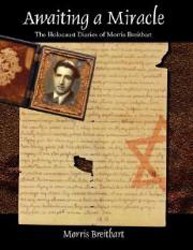Phillipp Manes, a proud Berliner who hadserved and been decorated with the Iron Cross in the Kaiser’s war of 1914, was as German as German could be — the son of a family that had lived in the Rhineland since the 18th century. During the years of the Weimar Republic, he was active in various associations related to the family business, fur-trading. All of this came to an end on Kristallnacht, and by the outbreak of war in 1939, all four of his children had left Germany.
His health deteriorating, he took solace in keeping a diary, continuing to document his life during his three years in Theresienstadt, which is why we now have this comprehensive history of that ghetto’s intellectual and talented inhabitants and the remarkable amount of culture they and Manes provided. Upset as Manes was that he and his wife had to leave their home and former life in 1942, after the initial shock of the Theresienstadt Ghetto in Czechoslovakia wore off, Manes saw its possibilities. He gradually transformed the Orientation Service to which he had been assigned into a “mixture of police station, theatrical performance venue, adult education center and concert agency.” Manes needed a distraction; he observed the ghetto being emptied by transports to the East and knew that eventually he and his wife’s time would come, although he did not envision killing centers.
His diary affords us the record of his activities, activities that provided him with a semblance of normality, including the perverted “beautification” of the ghetto to impress the Red Cross inspectors, and the filming of its results by the famous director Kurt Gerron.
He writes about the presentation of Mendelssohn’s “Elijah” under the direction of Karl Fischer, which was the largest artistic event under his watch. Manes also writes about taking solace in the music of Schubert, and in “Lieder” sung by Edith Weinbaum, as well as a poetry competition, and the beauty of flowers emerging in the spring. He never abandoned his hope of liberation and tried to keep the hope alive in his fellow prisoners. It took courage to write what he did, because if it were found, the punishment would have been severe, perhaps deadly. He repeatedly refers to the library in the ghetto and to books that he consulted in relation to the lectures and cultural events he produced. Ultimately, he was responsible for 500 intellectual lectures and musical presentation.





